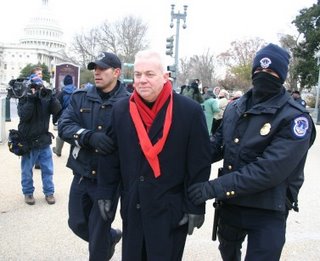
"We have not at all assimilated with the coalition forces. We have nothing to do with them, nor indeed do we have anything to do with the West. We are Christians; we are citizens like everyone else."
- Archbishop Louis Sako of Kirkuk, Iraq, speaking out against proposals by U.S. officials to create "safe havens" for Christians experiencing persecution there. (Source: The Catholic Herald)
This quote is especially interesting if looked at in the light of Bush Admin officials stating before the war, that soldiers would be "greeted as liberators."

On March 16, in an interview on NBC's "Meet the Press" Vice President Cheney said, "I think things have gotten so bad inside Iraq, from the standpoint of the Iraqi people, my belief is we will, in fact, be greeted as liberators." It was then he predicted that the regular Iraqi soldiers would not "put up such a struggle," and that even "significant elements of the Republican Guard . . . are likely to step aside." Asked if Americans are prepared for a "long, costly and bloody battle," Cheney replied: "Well, I don't think it's likely to unfold that way. . . . The read we get on the people of Iraq is there is no question but what they want to the get rid of Saddam Hussein, and they will welcome as liberators the United States when we come to do that." (Read: Article on language used by Bush officials before the war)
Even the Christian Church in Iraq seemingly desires to distance itself from American agenda or action.
While the ultimate effects of the war in Iraq remain to be seen, it is obvious very little good has transpired as a result of American military action. The region is ultimately more chaotic and lawless, there is no clear leadership and a seeming power struggle has brimmed on eruption.
What's outcome? Do troops need to start leaving? Do more troops need to come in as support? Both have been proposed recently.
Two sides to this argument: If American troops leave, it protects from suffering more American loss (in troops and in funds) and to some extent, admits, that indeed the Iraq War effort and motivation was lost. The region remains in mass chaos, suffering the damages of sectarian violence and a lack of real political power. America has to admit defeat and as long as violence and chaos reign in the region, the more America will be held responsible for their action and the lack of respect for international cooperation. Even more concerning is that Iraq may indeed be worse off (Read: UN Secretary General Kofi Annan's take). If future Iraqi government becomes closely aligned with Iran, or a brutal regime evolves as a result of sectarian violence and terror, America will look even more foolish and be held responsible for incompetence.
If American troops stay and bolster military support, it will undoubtedly continue to harm the image of the West in the Middle East, there will continue to be losses of American lives and simultaneously continue to fuel the recruitment and advances of terrorist activity, not just in Iraq, but around the globe. As exemplified since the beginning of the war, America has no effective course of action and no way to control guerilla and terrorist action. Not only does America's tarnished image suffer from further ineffectiveness, but it will also serve to similar groups as to what America can and cannot deal with.
 America is in a tough spot. There seems to be no path or direction which will be helpful to the situation, or the country's image. So where does Bush go from here? He starts apologizing and admitting that "staying the course" isn't always viable. He makes amends with the United Nations and Kofi Annan. He meets with local and national figure heads in the Middle East and seeks to cooperate with them in achieving some stability in the region, bolstered by a combination of aid incentives and "eating crow". The American people were told that Iraq was a threat to national security. The American president however, has caused even more damage to the security through illegitimate action of unilateral war and preemptive strikes. It seems the only way to start to remedy these abuses and violations is to start by apologizing.
America is in a tough spot. There seems to be no path or direction which will be helpful to the situation, or the country's image. So where does Bush go from here? He starts apologizing and admitting that "staying the course" isn't always viable. He makes amends with the United Nations and Kofi Annan. He meets with local and national figure heads in the Middle East and seeks to cooperate with them in achieving some stability in the region, bolstered by a combination of aid incentives and "eating crow". The American people were told that Iraq was a threat to national security. The American president however, has caused even more damage to the security through illegitimate action of unilateral war and preemptive strikes. It seems the only way to start to remedy these abuses and violations is to start by apologizing.



